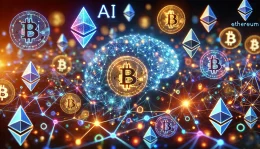Since the arrival of blockchains as an academic concept in the 1990s, they have been seen as a game-changer. They indeed changed how finance is perceived when first implemented through the legendary cryptocurrency Bitcoin. Suddenly, people became enthusiastic about the prospect of digitalizing life in the form which we had earlier imagined through literary content. Such a line of thought raised the standard and range of blockchain applications as time went by. Then, slowly, more applications related to cryptocurrencies started up their operations.
Additionally, more blockchain-based applications such as non-fungible tokens (NFTs), decentralized finance (DeFi), metaverses, and decentralized autonomous organizations (DAOs) came through successfully.
Non-fungible tokens, in particular, have attracted a massive market after their sales had gone up by extreme proportions within months. Even though the success has been mainly attributed to early NFT adopters, creators, and celebrities, the real credit goes to NFT marketplaces that handled the sudden surge efficiently.
Hence, it can be said that running an NFT marketplace could be a great business opportunity in the current crypto world. But, owning such a platform requires a great deal of diligence and patience, as creating a community around your platform involves hectic work even from the first step.
What is an NFT Marketplace Platform?
An NFT marketplace is a platform where people can buy, sell, and trade assets backed by non-fungible tokens (NFTs). They have been orchestrating an imminent role in driving NFTs to the levels that they are today. One can find all kinds of NFT assets on these platforms, such as art, music, video clips, in-game assets, trading cards, memes, profile picture punks, and more.
Some NFT marketplaces focus on horizontal trade, selling different kinds of NFT assets to concentrate on a generic audience. Others focus on running a platform based on vertical trade, where specific NFT assets targeting a niche audience are listed.
Examples of horizontal NFT marketplace are OpenSea, Rarible, Solsea, and LooksRare. Platforms such as SuperRare, Foundation, Sorare, Decentraland, NBA Top Shot, FanCraze, and Jump. trade are marketplaces that focus on a specific set of audiences. Trades in these marketplaces are typically made in exchange for cryptocurrencies, although a few of them accept crypto stable coins and fiat payments to widen their customer base.
What is the User Flow in an NFT Marketplace?
- First, users should create their account on the portal, irrespective of their status (buyer/seller), and connect their crypto wallet or fill cryptocurrency into the built-in wallet.
- Then the seller should mint NFTs to back their digital assets. They must provide sufficient information about the NFT, such as its details, cost (opening bid price/fixed price), deadline, and benefits.
- The marketplace admin will moderate the NFT asset, and if the items follow all their regulations, they are listed on the selling portal. The platform can also post the NFTs on a main page for a fee.
- A prospective buyer looks at the NFT and the details to place a bid or is willing to pay the price mentioned. The bid amount is taken from the buyer’s crypto wallet.
- If the seller finds that the offered bid satisfies them or the deadline is reached, they can accept the offer, which releases the NFTs to the buyer, and the amount is transferred to the seller.
- During the transaction, apart from the gas fee, a transaction fee may also be charged, with a lot of different combinations possible. The fees are typically taken as a proportion of final sales. The money is used for the platform’s maintenance and operations.
Salient Features of an NFT Marketplace Platform
- Storefront – The user-end portal should contain all the necessary information about NFT assets, such as descriptions, ownership history, bids, previews, and more.
- Search Engine – The marketplace should contain an advanced search feature, where users can easily search for the NFT items they need. A faster execution here is essential as this plays a significant role in determining the user experience.
- Filter and Sort Options – The NFT marketplace should also have a widespread filter option so that users can easily get relevant results and sort them easily according to their preferences.
- Listing Portal – Creators on an NFT marketplace should be able to mint and list their NFTs easily. A dedicated portal should allow sellers/creators to list their NFTs by providing necessary details, including descriptions, sale mode, and tags.
- Status Portal – This feature will be helpful for a seller while listing their NFTs for sale, as it will take some time for moderation. It will be beneficial for a seller who wishes to sell a collection of NFT collectibles.
- Bidding Portal – Buyers on the NFT marketplace should be able to place bids easily and update themselves with the current status. It is important to set a deadline date as this increases the interest for the NFT items auctioned on the platform.
- Crypto Wallet – It is a must-have feature for any NFT marketplace as they play a significant role in processing transactions. Although users can sign in with their wallet, it is advised to use a built-in wallet for security to offer a seamless experience to the users inside the platform. You can either build it from scratch or coordinate with a popular wallet provider like MetaMask or Coinbase.
- Ratings and Reviews – It is essential to have these features so that buyers can know which sellers are the best before making a purchase. In particular, newbies to the NFT world will feel at home when they can judge the worth of an NFT item based on the ratings and reviews given.
A Step-wise Guide to Develop an NFT Marketplace Platform
- Ideate – Like every other startup project, the initial phase of creating an NFT marketplace is to plan for it extensively. You should think about all the facets that can come into play. Some factors involved here include business, target market, niche, competitors, solution, features, marketing, payment, and technologies employed. Then, based on all the plans and decisions, frame the whitepaper that can help if you need funds.
- Design – After crafting your NFT marketplace venture plans, it is ideal to start designing your platform. Use necessary technical tools, including web.js, HTML, and React, to create the user-end screens. Ensure that the user interface (UI) provides an immersive user experience (UX). Get suggestions from a limited user base and implement them in the future.
- Develop – After having the user-end portal ready, it is time to develop the back-end, which supports all the front-end operations. Again, use advanced blockchain coding techniques, including Solidity, Python, C++, and Java. Also, it is the stage where you should create the smart contracts for NFTs, native tokens for your platform, and integrate your platform into the blockchain network.
- Test – After carrying out full-scale development of your platform, you should conduct intense testing. Alpha and beta testing should be performed with a small set of users and repeated automated test cases. Errors found should be resolved immediately to ensure that the final platform is free from bugs.
- Launch – It is now time to launch your platform for public use. Ensure that you have your user base ready through extensive marketing across mediums. A great way to gather your initial user base is to offer great advantages to early users. It is also important to have multiple communication channels for your venture through which you can get valuable feedback. Upgrade your platform periodically based on feedback to keep up with the trends.
What is the Difference between Hiring In-house Developers and an Expert Firm?
Fundamentally speaking, both the options give you the platform you asked for, although there are a lot of internal differences. For instance, finding in-house developers with enough experience developing blockchain applications is challenging as the technology is still emerging.
Also, the expenses involved in employing them are massive as their work experience demands higher tariffs, irrespective of hiring full-time employees or freelancers for the duration of the project.
On the other hand, a few firms excel in NFT marketplace development and have a team of experienced professionals. Such firms can create the platform according to your requirements while ensuring that no compromises are made in the fundamental aspects.
The expenses associated with employing these outsource companies are also lesser than having developers work under your eyes. Recently, a few regions in Asia have been becoming blockchain hotspots as they have a lot of talented blockchain developers forming the backbone for some of the pioneer development companies in the area.
Summarizing Thoughts
Therefore, we can say that an NFT marketplace is one of the most profitable business ventures in the blockchain world. As far as development options are concerned, it depends on your ambitions and constraints, although working with an experienced development firm would sound ideal.
With the world starting to embrace NFTs, it is only affirmed that new niches enter the NFT world, and hence, more unique marketplaces would start their operations underway.
Image Credit: Provided by the Author; Thank you!






























